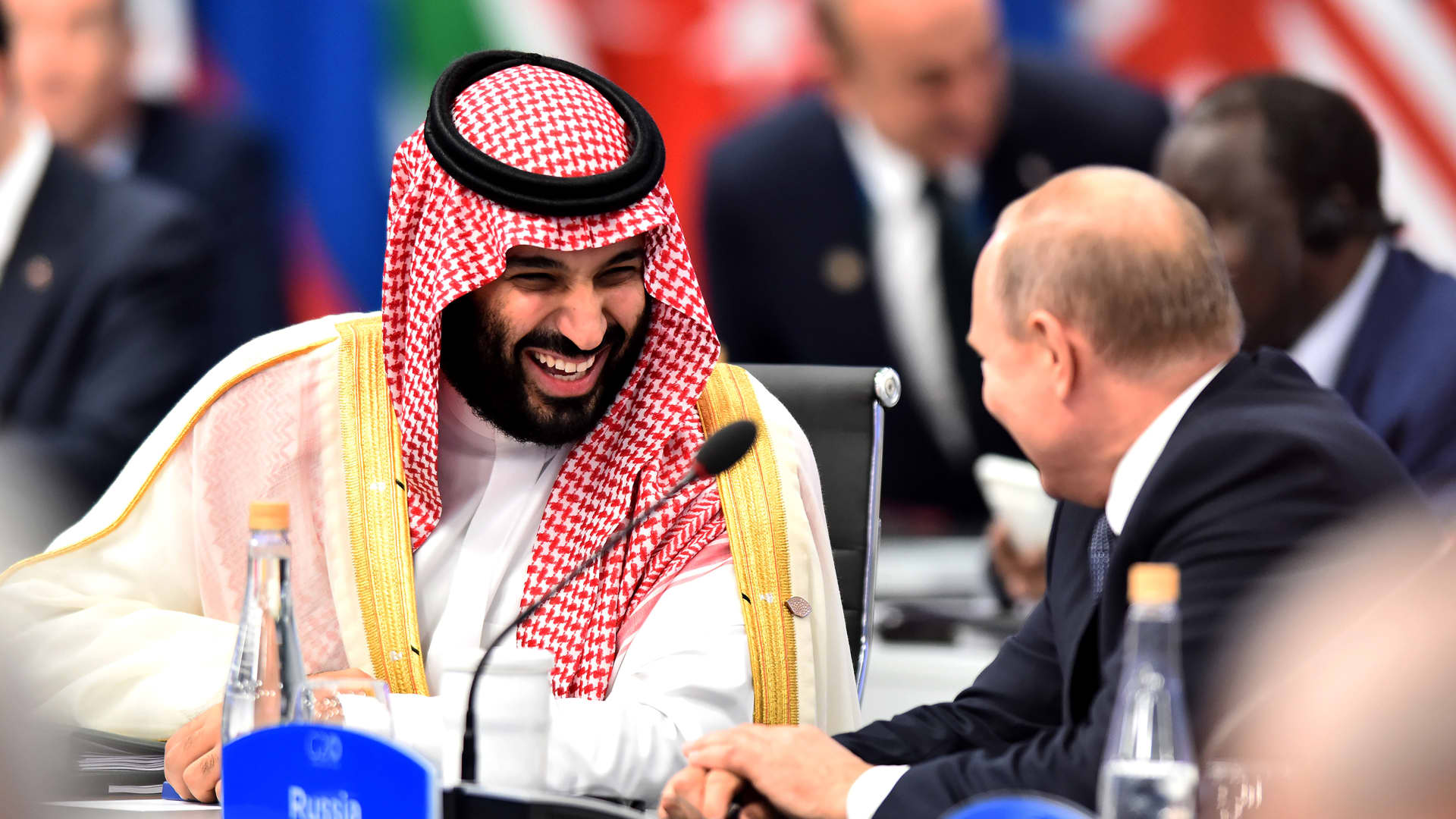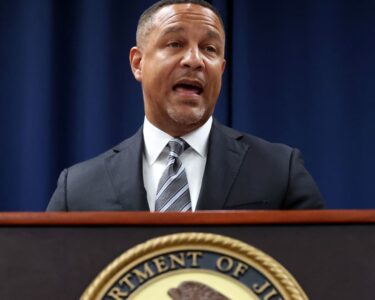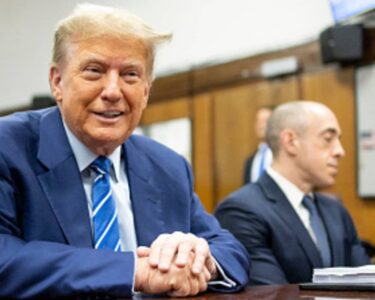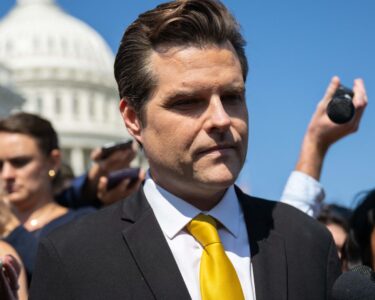This was CNBC’s live blog tracking developments on the war in Ukraine on Dec. 6, 2023. See here for the latest updates.
Russian President Vladimir Putin is making a rare trip abroad Wednesday as he meets with allies in the Middle East. His talks with the leaders of Saudi Arabia and the United Arab Emirates will focus on increasing bilateral cooperation and the war between Israel and Hamas.
Russia’s visit to the Middle East sees it reasserting its diplomatic clout in the region, with Moscow occupying the rare position of being allies with regional arch-rivals, Iran and Saudi Arabia, as well as surrounding countries such as Syria, Iraq, the UAE and Qatar.
Russia had also enjoyed cordial relations with Israel but has become increasingly critical of the conflict in Gaza as the humanitarian crisis has worsened.
While Russia is strengthening its ties, Ukraine’s are looking shakier than ever amid continuing wrangling over future funding of the country, particularly in the U.S.
War crime charges have been filed against four Russian nationals by the U.S. Department of Justice, according to an indictment that was unsealed Wednesday.
The four soldiers are being charged with three counts of war crimes and one count of conspiracy to commit war crimes against a U.S. citizen.
“As the world has witnessed the horrors of Russia’s brutal invasion of Ukraine, so has the United States Department of Justice,” Attorney General Merrick B. Garland said in a statement released on the Department of Justice’s website on Wednesday.
“That is why the Justice Department has filed the first ever charges under the U.S. war crimes statute against four Russia- affiliated military personnel for heinous crimes against an American citizen.”
“Torture, inhuman treatment and unlawful confinement of a U.S. national” are part of the accusations, the statement said. This includes interrogation, beating, threats to the victims life and a mock execution, the statement noted.
The victim is said to have been abducted from his home in Ukraine before being taken to a military compound, according to the statement.
— Sophie Kiderlin
Russia in recent weeks rejected a substantial new proposal for the release of Paul Whelan and Evan Gershkovich, two Americans considered by the U.S. to be “wrongfully detained” in Russia, State Department spokesperson Matthew Miller said on Tuesday.
Miller declined to provide details on what Washington proposed and it was the first time the United States revealed such a proposal had been made. Whelan and Gershkovich have been charged in Russia with spying, which they deny.
“In recent weeks, we made a new and significant proposal to secure Paul and Evan’s release. That proposal was rejected by Russia. We shouldn’t have to make these proposals. They never should have been arrested in the first place. They should both be released immediately,” Miller told reporters.
“It will not deter us from continuing to do everything we can to try and bring both of them home.” The proposal was not for other detainees, Miller said.
The Russian state news agency RIA on Wednesday quoted Kremlin spokesman Dmitry Peskov as responding by saying: “We don’t discuss this topic in public.”
— Reuters
The U.K. announced 46 new sanctions Wednesday targeting individuals and groups that it accused of “supplying and funding Putin’s war machine.”
The sanctions include the targeting of businesses in Belarus, China, Serbia, Turkey, the UAE and Uzbekistan who continue to support Russia’s illegal invasion of Ukraine, the Foreign, Commonwealth and Development Office said in a statement.
Russian weapons manufacturers and defense importers were also among the list of 46 new sanctions imposed as well as three entities and individuals supporting the Wagner Group network and operators of so-called “shadow fleet” vessels “used by Russia to soften the blow of oil-related sanctions imposed by the U.K. alongside G7 partners.”
“Today’s measures will disrupt Putin’s ability to equip his military through third-party supply chains in Belarus, China, Serbia, Turkey, the UAE and Uzbekistan,” the FCDO said.
Among those sanctioned today were 31 individuals and entities linked to Russia’s military industrial complex and the designing and manufacturing of drones and missile parts and the importing and supplying key electronic components.
The latest sanctions package comes as G7 leaders meet virtually to discuss and agree additional measures designed to reduce revenue streams that Russia needs to finance its war in Ukraine.
G7 leaders are expected to announce a ban on Russian diamonds and measures to manage some 300 billion euros ($323.58 billion) in immobilized Russian central bank assets, sources familiar with the matter told Reuters earlier.
— Holly Ellyatt
Russia’s relations with the United Arab Emirates have reached an “unprecedented high level,” President Vladimir Putin said Wednesday as he began a working trip to the Middle East.
Putin prepared to begin negotiations with UAE President Mohammed bin Zayed Al Nahyan by calling the emirates Russia’s main trading partner in the Arab world.
“Today, thanks to your position, our relations have reached an unprecedented high level. And we are in constant contact, our colleagues are constantly working with each other,” Putin said at the start of talks.
Discussions are expected to focus on “the state and prospects for further development of multifaceted Russian-UAE cooperation, as well as current international issues with an emphasis on the state of affairs in the Middle East region,” the Kremlin said earlier.
In comments ahead of the talks, Putin said “we will discuss with you the situation in the hottest spots, first of all, of course, in the Arab-Palestinian-Israeli conflict. Of course, I will inform you about the situation in the Ukrainian crisis,” he added.
— Holly Ellyatt
Russia has almost certainly augmented Iranian-supplied Shahed one-way attack drones, or uncrewed aerial vehicles (OWA UAVs), with similar weapons made in facilities in Russia since mid-2023, Britain’s Ministry of Defense said Wednesday.
“Russia is now almost certainly attempting to incorporate improvements to the OWA UAV designs based on operational experience,” the ministry said on X, formerly known as Twitter.
“In late November, a downed UAV was reported as being fitted with a Ukrainian SIM card and 4G modem. This is likely a Russian improvised modification to improve real-time guidance using cell towers to reduce reliance on satellite navigation,” it noted.
There is a realistic possibility that it is also attempting to mitigate Ukrainian electronic warfare measures, the ministry added in its intelligence update, while some other Russian-made OWA UAVs have likely been given a black finish, making it harder to identify the incoming drones at night.
Drones have become a key fixture in the war between Russia and Ukraine, with each side deploying drones for intelligence gathering and to direct artillery as well as weaponized, munition-carrying UAVs to attack each other’s forces and infrastructure extensively.
“Russia is increasingly employing OWA UAVs in large raids in an attempt to overwhelm Ukrainian air defences. However, Ukraine continues to successfully neutralise the majority of incoming weapons,” the U.K. noted.
— Holly Ellyatt
Hungary’s ruling party submitted a resolution to parliament on Wednesday, calling on the government not to support the start of talks on Ukraine’s EU accession as Budapest steps up pressure on Brussels ahead of a crucial summit next week.
Prime Minister Viktor Orban has warned that EU leaders could fail to reach a consensus on starting membership talks with Ukraine and said the issue should not be put on the summit’s agenda.
Distrust of Orban has been running high in Brussels after bitter run-ins during his 13 years in power over the rights of gay people and migrants in Hungary, as well as tightening state controls over academics, the courts and media. This resulted in billions of euros of EU funds for Hungary being frozen.
“The European Union’s expansion policy should remain an objective process based on rules and performance,” the parliamentary resolution submitted by the ruling party said.
“The start of membership talks with Ukraine should be based on a consensus among European Union member states… The conditions for this are not present today.”
It said EU leaders should first make a thorough assessment of how Ukraine’s possible membership would affect cohesion and agricultural policies within the bloc, of which the EU’s poorer members, including Hungary, are among the main beneficiaries.
A large-scale inflow of Ukrainian grains into the EU triggered protests from farmers in eastern Europe last year, while Polish truckers have blockaded several border crossings with Ukraine, calling on the EU to restore permits limiting transit for Ukrainian competitors.
Orban will meet French President Emmanuel Macron in Paris on Thursday, ahead of the summit, his press chief said.
— Reuters
Ukraine’s allies are trying to mount a show of support to Ukraine this week as the future of more military funding is in doubt.
Leaders of the Group of Seven countries are set to hold a virtual meeting on Wednesday with Ukraine’s President Volodymyr Zelenskyy. The war will be on the agenda, but the meeting comes amid bitter wrangling between U.S. lawmakers over an additional aid package of over $100 billion that would include aid to Ukraine and Israel, as well as U.S. border security funding.
There are heightened concerns that if Ukraine does not receive more aid, it will not be able to continue fighting Russia’s invasion, a prospect worrying U.S. and Ukrainian officials as the summer counteroffensive is already deemed to have largely failed in its objectives.
U.S. Treasury Secretary Janet Yellen said Tuesday that the U.S. would be “responsible for Ukraine’s defeat” if Congress failed to approve the Biden administration’s multibillion-dollar funding request for Ukraine, Reuters reported. Meanwhile, Zelenskyy’s chief of staff Andriy Yermak said Tuesday that there was a “big risk” that Ukraine would lose the war without further U.S. funding.
Zelenskyy canceled a virtual briefing with U.S. lawmakers Tuesday as the furore over future aid continued. No reason was given for the cancellation.
— Holly Ellyatt
Russian President Vladimir Putin is making a rare trip abroad Wednesday as he meets with Moscow’s allies in the Middle East: Saudi Arabia and the United Arab Emirates.
Here’s what’s on the agenda for the meeting, according to a readout from the Kremlin:
Talks with UAE President Mohammed bin Zayed Al Nahyan are expected to focus on the current state of multifaceted bilateral cooperation and the prospects for further expansion of ties, as well as current international issues, with an emphasis on the situation in the Middle East.
In Riyadh, Vladimir Putin is scheduled to meet with Crown Prince and Prime Minister of Saudi Arabia Mohammed bin Salman Al Saud. The talks will focus on the bilateral cooperation in trade, economic and investment spheres, and on various aspects of interaction in multilateral formats. The leaders will also exchange views on the regional and international agenda.
The working trip is Putin’s first visit to the region since October 2019, although Russia, Saudi Arabia and the UAE have regular diplomatic ties and all belong to the major oil producing alliance known as OPEC+.
Russia’s visit to the Middle East sees it reasserting its diplomatic clout in the region, with Moscow occupying the rare position of being allies with regional arch-rivals, Iran and Saudi Arabia, and surrounding countries such as Syria, Iraq and Qatar. Russia also enjoyed cordial relations with Israel but has become increasingly critical of the conflict in Gaza as the humanitarian crisis has worsened.
Putin is also set to welcome Iranian President Ebrahim Raisi to Moscow Thursday, with analysts at the Institute for the Study of War noting Tuesday that Putin’s “bout of diplomatic outreach” was “likely focused on strengthening Russia’s position with Gulf States while continuing to solidify the deepening Russian–Iranian security partnership.”
— Holly Ellyatt
Moscow has repeated that it’s ready for talks with Ukraine, with the Kremlin’s spokesman claiming Russia would prefer to negotiate through “political and diplomatic means.”
“The President has repeatedly said that the main thing for us is to achieve our goals [in Ukraine],” Kremlin Press Secretary Dmitry Peskov told RTVI, Russian state news agency Tass reported.
“And, of course, we would prefer to do this primarily through political and diplomatic means. That’s why we remain ready for negotiations.”
Peskov again reiterated Moscow’s criticism of Ukraine for pulling out of previous negotiations. Kyiv has said it won’t hold talks with Moscow while Russian troops remain on its territory.
The Kremlin representative also commented on a report in the Izvestia newspaper, which stated that negotiations between Moscow and Kyiv could resume on the territory of one of the Western countries — for example, in Hungary. Peskov said that the idea could theoretically materialize.
— Holly Ellyatt
Ukraine President Volodomyr Zelenskyy and top aides to U.S. President Joe Biden will make their case to U.S. senators on Tuesday about why a fresh infusion of military assistance is needed to help Ukraine repel Russian invaders.
U.S. officials say the United States will spend all it has available for Ukraine by the end of the year, a dire prediction that comes as Kyiv has struggled to make major advances in its 2023 counteroffensive against Russia.
Biden’s administration in October asked Congress for nearly $106 billion to pay for ambitious plans for Ukraine, Israel and U.S. border security, but Republicans who control the House with a slim majority rejected the package.
Senate Majority Leader Chuck Schumer, a close Biden ally, announced on Monday night that the administration has invited Zelenskyy to address senators via secure video as part of a classified briefing on Tuesday “so we can hear directly from him precisely what’s at stake in this vote.”
In addition, a variety of top Biden officials, including Defense Secretary Lloyd Austin and Secretary of State Antony Blinken, are expected to brief the senators on Tuesday.
Zelenskyy told Reuters in a November interview that despite the slow going, Ukraine would try to deliver battlefield results by the end of the year and that he remained sure Kyiv would eventually have success in the war despite difficulties at the front.
But the stalled drive to get U.S. assistance has alarmed the Biden White House, which fears a failure to help Ukraine further would increase the likelihood of Russian victories.
— Reuters
Kyiv Mayor Vitali Klitschko told a Swiss media outlet that he agreed with a recent assessment made by the Commander-in-chief of the Armed Forces of Ukraine Valery Zaluzhny that the war had “reached a stalemate.”
Zaluzhny told The Economist magazine last month that the conflict had “reached a stalemate” and a “deep and beautiful breakthrough” looked increasingly unlikely. The comments reportedly caused controversy between the military chief and Ukraine’s President Volodymyr Zelenskyy, who disputed the characterization of the state of the war.
Speaking to Swiss publication 20 Minuten over the weekend, Kyiv Mayor Klitschko said Zaluzhny had “told the truth.”
“Some may not want to hear the truth [but] we can’t lie to our people and partners indefinitely,” he said.
Klitschko also criticized Zelenskyy, saying the president’s popularity had declined because “people see who is effective and who is not. And there were and are many expectations. Zelenskyy is paying for the mistakes he made,” he said.
When asked what mistakes Zelenskyy had made, Klitschko said Ukraine had not been prepared for the war.
“People wonder why we weren’t better prepared for this war. Why Zelenskyy denied until the end that it would happen. Or why it was possible that the Russians were able to reach Kyiv so quickly,” he said.
Despite the criticism, Klitschko said the president “has an important function today and we must support him until the end of the war. But at the end of this war, every politician will pay for his successes or failures.”
The criticism of Zelenskyy comes amid questions about the 2024 election in Ukraine. The president and his advisors have rebuffed the notion of holding a vote when the war is ongoing (and elections are prohibited during times of war in Ukraine) but Kyiv wants to burnish its democratic credentials as it looks to join Western blocs, such as the EU.
— Holly Ellyatt
Russian President Vladimir Putin will on Wednesday visit Middle East allies Saudi Arabia and the United Arab Emirates, before receiving Iranian President Ebrahim Raisi in Moscow the day after.
The Kremlin announced the scheduled meetings, according Reuters and Google-translated comments reported by Russian state news agency Tass on Telegram.
Putin previously visited Saudi Arabia and the UAE in October 2019, according to Tass. It is unclear if the Russian leader will formally attend the U.N.’s COP28 climate conference, which is taking place in major UAE hub Dubai until Dec. 12.
Putin has been selective in his foreign travel since the March issuance of an International Criminal Court arrest warrant over his alleged responsibility for the unlawful deportation and transfer of children during Moscow’s war in Ukraine. Saudi Arabia and the UAE have yet to ratify the Rome Statute that defines the ICC’s purview.
The Kremlin specified that Putin’s engagements in Saudi Arabia and the UAE will discuss topics including the oil market and the Israel-Hamas conflict.
Moscow, Riyadh, Abu Dhabi and Tehran are policy-setting partners in the OPEC+ oil producers’ alliance, and Putin’s visit comes amid an ongoing slump in oil prices that the Thursday announcement of a spate of voluntary supply cuts have so far failed to resuscitate. The three Middle Eastern countries were also invited to join the Russia and China-led BRICS bloc of emerging markets in August.
Initially more restrained in its criticism of Israel, Russia has since joined the three Middle Eastern countries in expressing concern over casualties in the Gaza Strip throughout the Israel-Hamas conflict. Iran outright sponsors the Palestinian militant group, but denied involvement in its terror attacks of Oct. 7.
— Ruxandra Iordache
Ukraine signals a shift toward defense as analysts ask whether ‘failed counteroffensive’ is over






